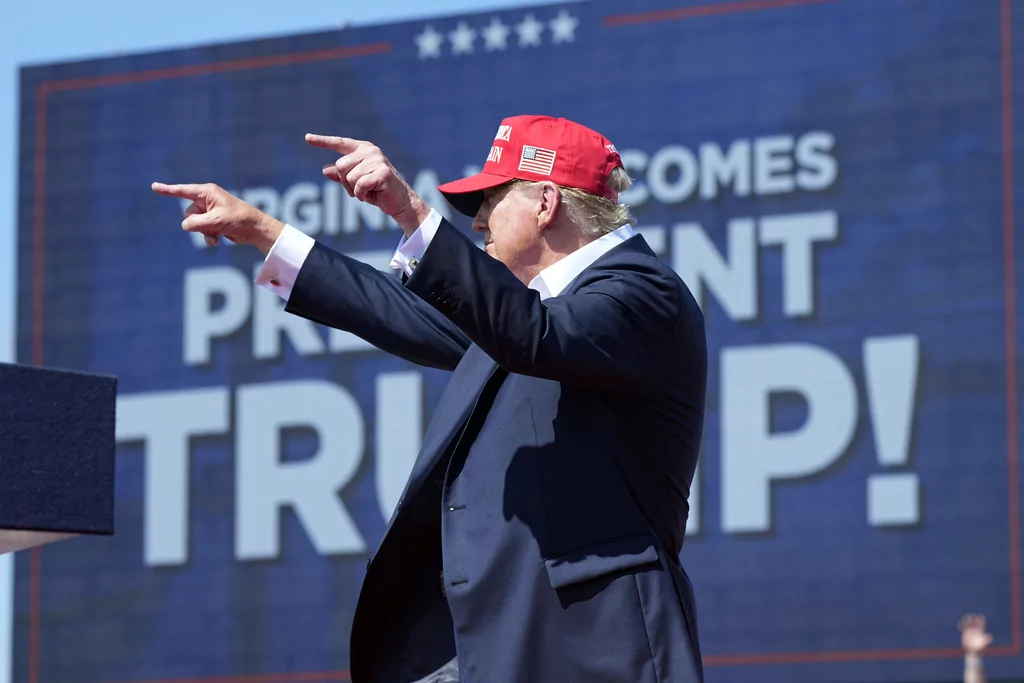

Former President Donald Trump is putting his stamp on the Republican platform, and not all conservatives like it.
There has been a substantial revision to the plank on abortion, along with a reduction in the number of times the issue is mentioned compared to 2016. There has been anti-abortion language in the platform since 1976, though this has been the first that will be adopted after the reversal of Roe v. Wade.
Gone are the references to debt and deficits that have been a staple of recent past platforms. Republican administrations have not had a great track record on these issues for decades, but there was at least an aspirational commitment to fiscal discipline in the party that often reasserted itself when Democrats held the White House. Public debt is set to jump to 122% of GDP in the decade following the election.
Tariffs are in, though they are coupled with tax cuts for working families. Trump hinted to congressional Republicans earlier this year that he would like to replace the income tax, a dramatic shift that was GOP orthodoxy many years ago but would not add up under current federal spending levels.
WHO IS JD VANCE? MEET ONE OF THE EIGHT TOP NAMES ON TRUMP’S VP SHORT LIST
Packed with Trumpian turns of phrase and his penchant for unusual capitalization for emphasis, parts of the platform were reportedly written by the presumptive Republican nominee himself. It sure looked like it.
Trump has also disavowed Project 2025, a Heritage Foundation initiative to provide his second administration with a conservative agenda that will be ready on day one. “I disagree with some of the things they’re saying and some of the things they’re saying are absolutely ridiculous and abysmal,” Trump posted on Truth Social. “Anything they do, I wish them luck, but I have nothing to do with them.”
The former president also joined forces with centrist Republicans to defeat Rep. Bob Good (R-VA), chairman of the conservative Freedom Caucus, in a closely fought GOP primary. (A recount is coming.) Good initially backed Gov. Ron DeSantis (R-FL) for president in the primaries and was seen as an obstacle to getting legislation across the finish line in a closely divided House.
At the same time, there are conservatives in good standing who think moving in a more Trumpian direction is the way to go. The National Conservatism Conference began its latest sessions in Washington, D.C., as the proposed GOP platform was coming out. But many of the advocates of “conservative realignment” would like to see social conservatism play a bigger role in the coalition than foreign policy hawks or what they see as libertarian-tinged economic conservatism, which is only partially in evidence in the document to be voted on by delegates in Milwaukee next week.
“As we speak, the Republican Party is dropping family and life from its platform. And we wonder why it lost the last elections,” Sen. Josh Hawley (R-MO) said in a speech to the NatCon gathering that also praised private sector unions and said labor should not be taxed more than capital.
You wouldn’t know there had been a shift in the GOP platform from the Biden-Harris campaign reaction. “In a desperate attempt to conceal his extreme stance on abortion, Donald Trump directed the RNC to hide the ball on their unpopular plans to ban abortion nationwide — with or without Congress,” the campaign said in a statement.
The 2016 Republican platform was a mixture of Trump agenda items — the plank on Russia and Ukraine became a major part of the Trump-Russia affair — and pre-Trump GOP policy positions. Trump had beaten movement conservatives like Sen. Ted Cruz (R-TX) to win the nomination but was relatively new to the Right and selective about when to make waves. He gave legal and social conservatives a list from which he would choose Supreme Court justices. The fulfillment of those promises led to the reversal of Roe.
The first two years of Trump’s term were also a sort of coalition government between the then-president and more conventional Republican leaders like Sen. Mitch McConnell (R-KY), who was Senate majority leader at the time, and former Rep. Paul Ryan, the Wisconsin Republican who served as speaker of the House. They focused on areas of agreement, like tax cuts, judges, and Obamacare repeal.
Ryan is now gone from Congress, and McConnell will be stepping down from leadership at the end of the year, to coincide with a possible Trump return.
Anti-Trump Republicans often warned that Trump would not be conservative in addition to concerns about his temperament and character. The latter concerns only intensified in the aftermath of the 2020 election, but by the time Trump ran for reelection most Republicans were satisfied that he was conservative enough.
Sometimes Trump’s political instincts were sharper because he was not a creature of the conservative movement. At the beginning of the 2016 Republican nominating process, some of his opponents had difficulty distancing themselves from the Iraq War. Not so Trump.
But for a newcomer, Trump also showed good judgment about which factions of the conservative movement he could safely ignore and which he had to accommodate. He determined that abortion opponents and gun rights activists were more numerous than free traders and Social Security privatizers. Trump flirted with bipartisan deals on gun control and even immigration, but they never came together.
Organized conservative opposition to Trump was ineffective in the 2016 primaries, as he defeated 16 other Republican candidates. He beat both DeSantis and former U.S. Ambassador to the United Nations Nikki Haley this year.
CLICK HERE TO READ MORE FROM THE WASHINGTON EXAMINER
Trump is eyeing the GOP coalition from a position of much greater strength since his term. He is also confronting the possibility of facing a Democratic nominee other than President Joe Biden, which could prompt a pivot to the center.
The question remains about what to expect of Trump in a second term when he will not be eligible to run again in 2028. There has always been an element of Trumpism that is more about pugilism than policy. As Republicans get ready to nominate him for the third straight time, Trump is offering a preview of what things might look like if he is restored to power.




